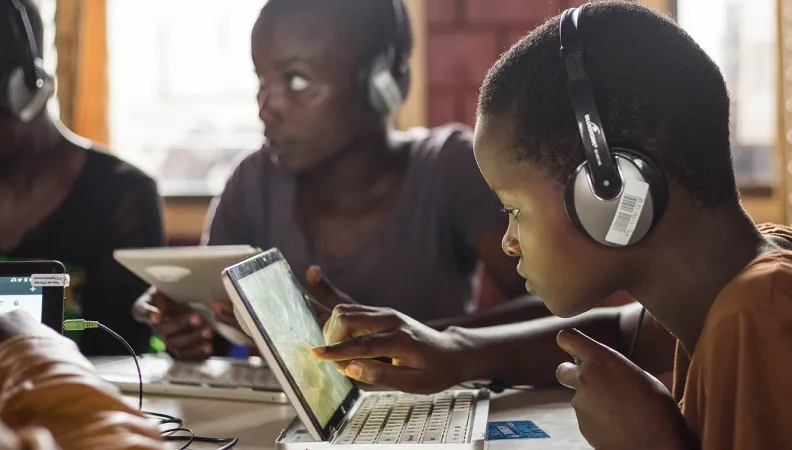Share the page
“More tech companies are developing in Africa than in the rest of the world”
Published on

Digital technology is playing an increasingly prominent role in Africa’s economic development. In fact, more tech companies are developing across the continent than in the rest of the world. In the approach to the VivaTech technology and start-up event in Paris from June 14 to 17, we interview Alain Kiyindou co-author of “African Economies in 2023.”
Alain Kiyindou is Professor of Information and Communication Sciences at Bordeaux-Montaigne University. He also holds the UNESCO Chair for Emerging Practices in Technology and Communication for Development.
What role does digital technology play in Africa today?
Alain Kiyindou: In Africa, the digital economy is one of the pillars of its development. All the strategies currently at work there assign a crucial role to digital technology, because we now know that this sector generates significant spin-offs. That’s why the different governments are investing more and more to boost this economy. Its growth requires the development of infrastructure, including cabling and access to fiber optics, and the Wacs (West Africa Cable System) and Cab (Central Africa Backbone) are good examples.
One priority with regard to infrastructure is the establishment and maintenance of data centers. Today, we know the digital economy is based on the use of data, which is why we have to collect, store, process, and above all secure information. Yet, Africa is home to less than 1% of the world’s data centers. Currently, these tasks are carried out by foreign clouds. We’re realizing that when it comes to security aspects—and especially national security—it’s absolutely necessary that data be brought back to its countries of origin.
See also: African Economies: the Outlook for 2023
On that note, what Africa lacks today are so-called supercomputers. If we want to implement strategies that involve artificial intelligence (AI), for example, countries will need to equip themselves with machines capable of performance to match it. Several countries have invested in AI, such as Morocco and Senegal. But there are few examples in Francophone Africa. One solution would be to pool this infrastructure so as to minimize the financial burden on national economies and thereby share knowledge.
We can see encouraging progress, with a big continent-wide market. Today, more tech companies are developing in Africa than in the rest of the world, and there is huge potential. And within this digital economic ecosystem, one area is clearly making progress: fintech (for “financial technology”), with companies using innovative solutions to financial services. There are currently 674 fintech companies operating in Africa. And it’s estimated that revenue from mobile payments alone could reach $20 billion by 2025.
What’s special about African fintech?
What sets African fintech apart is the complexity of the ecosystem in which it’s developing. In short, there are areas where there are generally very few banks and where procedures are very complicated. These new technologies make it much easier to access financial services, even in rural areas.
The mobile telephone system is undoubtedly the key driver behind this digital revolution. In fact, digital technology in Africa relies above all on mobile phones. Some countries are in the process of developing 5G, and around 50% of Africans currently have access to 4G. Penetration rate on the continent is around 80%.
See also: More Rwandan Public Services are Going Digital with the Support of AFD
Money transfers within the family or between friends can now be done directly via a telephone or through kiosks in markets and villages.
Unfortunately, these strong points are distributed unevenly. It’s currently Nigeria, where nearly $2 billion in funds has been raised, that clearly dominates the sector. Central Africa, in contrast, remains sidelined, possibly due to a less harmonized market than elsewhere and its relatively marked political instability.
There’s been a lot of talk about AI in recent months, but what’s its status in Africa?
Artificial Intelligence has great potential. Companies like IBM and Google have set up AI research centers in Accra, Ghana, which has made it possible to attract and use local talent. Kenya, Egypt, and Benin have implemented strategies entirely dedicated to the development of AI. Several universities, especially ones in Johannesburg and Cairo, have created their own curricula on AI. There’s also the creation of Caria (African Research Center for Artificial Intelligence) in Congo Brazzaville.
See also: AFD Digital Energy Challenge: boosting energy access across Africa through innovation
On an individual level, there’s plenty of African talent. In DRC, Thérèse Kirongozi has created intelligent robots capable of regulating traffic in the city of Kinshasa. In Cameroon, Véronique Boumtje has developed an AI-based device to help diagnose blood cancers. In Guinea, Mountaga Keita founded Tulip Industries, a company specializing in the production of internet kiosks, called “Tenor kiosks” or “standing computers.” These are terminals featuring several local languages and all the latest features. This innovation won the gold medal at the 47th International Exhibition of Inventions Geneva.
What does the future hold for African digital technology?
Africa is experiencing real dynamism but still faces a number of challenges. One in particular is the harmonization of laws and standards, which the African Union is tackling with the creation of AfCFTA (the African Continental Free Trade Area). And Papss, the Pan-African Payment and Settlement System, is expected to deliver significant savings in payment transaction costs in the near future.
What we must especially avoid now is what’s called techno-colonialism. We must reach the right conditions for the development of local companies capable of competing with international players. I’m quite optimistic: the significance of the digital market in Africa and the demographic explosion we can see throughout the continent will undoubtedly be the levers of its development.
